
About
Save our planet
To sustain life on earth, we must protect our most vital resource – the environment – and safeguard the ecosystems which connect all life forms and also provide clean air, safe water, and healthy food. With climate change exacerbating society’s challenges at an unprecedented rate, we need to join together and act with great urgency because the future of humanity depends on it.
Find solutions through life sciences
Life sciences must lead the way forward. From microbes that can degrade pesticides and plastic to marine plankton that removes CO2, the study of living organisms can help us find novel solutions to pressing environmental challenges. There is still a gold mine of potential solutions to be discovered by molecular biologists.
Empower the brightest minds
The idea behind ERI is simple: it is a bold initiative to drive cutting-edge research on environmental issues using any aspect of modern molecular biology at EMBL. We recruit pioneering scientists to tackle environmental challenges and empower them to realize their scientific ideas with EMBL’s unrivaled research expertise and state-of-the-art microbiology technologies.
Download the ERI summary (PDF)

“I started the Environmental Research Initiative (ERI) because I see a tremendous chance in bringing EMBL’s world-leading know-how in the life sciences to the pressing problems of our times. For over 30 years at EMBL, I’ve witnessed first-hand what EMBL’s Nobel Prize-winning expertise in the life sciences and unique mentoring culture can do for young talented scientists. This is precisely why EMBL is the ideal place to help lay the groundwork for finding solutions to global challenges. Join me to support pioneering scientists to find new and creative solutions through life sciences research as the most effective way to preserve our environment.”
— Prof. Matthias Hentze, EMBL Director
Strategy
The ERI vision is to support dedicated research groups at EMBL, entirely committed to addressing environmental challenges head-on. To get there, our strategic approach begins with 1-year pilot projects. The ERI projects serve as stepping stones, demonstrating proof of concept of what EMBL can do in environmental research at minimal cost.
As the next phase before launching ERI groups, ERI Fellowships are designed to support more extensive, mid-term projects focused on tackling environmental issues and empower postdoctoral researchers over a 2-4 year period. These fellowships not only foster ‘green’ careers but also enable researchers to hone their skills and have a profound, enduring impact on our environment.
We have now completed the pilot phase and are excited to enter the second phase of launching the first ERI fellowships at EMBL. As we also celebrate 50 years of world-class science at EMBL in 2024, we invite you to join us on this transformative journey toward a healthier planet for generations to come. Together, we have the power to shape a brighter, more sustainable tomorrow through life sciences.

Projects
ERI’s pilot projects were started in 2021, supported by seed funding by generous private citizens and the Friends of EMBL programme.
The currently running ERI projects (started in 2022) are:
Harnessing plankton to combat marine pollution
Goal: Preserving marine ecosystems through innovative pollution control
Purpose: Evaluating the impact of pollutant absorption on plankton communities
Achievement: Pioneering analytical methodologies enables EMBL scientists to take a comprehensive look at how plankton, transported by tides and currents, absorb pollutants and influence their own communities. This will help researchers to develop plankton-based indicators, crucial tools in combating marine pollution and safeguarding the vitality of marine ecosystems.
This project was launched in early 2023 through the collective donations of the global EMBL alumni community (€10,340 raised so far).
Download the project’s summary (pdf)

“Planktonic species are incredibly important when it comes to ecosystem stability: they support life in the ocean, and therefore us. Understanding the interactions between their survival and chemical pollution is of prime importance to protect planetary health. ERI support has enabled us to kickstart a project that explores uncharted areas at the interface of phytoplankton, their microbiome, and marine chemical pollution. Most importantly, it has given me the necessary push to take a risk I may have otherwise not taken.”
— Dr. Flora Vincent, EMBL Group Leader
Unveiling the power of microbial mats in pollutant degradation
Overarching goal: Revolutionising how we remove ocean pollutants
Project purpose: Exploring microbial mats as tools to break down pollutants
Achievement: Through pioneering spatial -omics techniques at EMBL, deeper insights into the capabilities of microbial mats – nature’s ‘vacuum cleaners’ – to degrade pollutants such as oil, microplastics, and heavy metals have been made possible. This newfound understanding fuels the advancement of targeted bioremediation techniques to combat chemical pollutants in our oceans.
This project was launched in 2022 and supported by donations by the ‘Friends of EMBL‘. (Funded: €28,295)
Download the project’s summary (pdf)
The first ERI projects (started in 2021) are:
Tackling plastic pollution through X-ray technology
Overarching goal: Revealing the impact of nanoplastics on our ecosystems
Project purpose: Leveraging advanced X-ray technology for deeper insights
Achievement: By utilising cutting-edge X-ray technology at EMBL, a refinement of the methods to study nanoplastics entering both marine environments and human bodies has been achieved. This
pivotal insight sheds light on the potential threats posed to marine ecosystems and human well-being and offers hope for solutions.
This project was launched in 2021 and supported by donations from the ‘Friends of EMBL‘ and other generous private citizens. It has also resulted in an interactive children’s science lab book to learn about plastic pollution in the ocean. Recently (in 2023), the project has led to partnerships, for example, with the Technical University of Munich, to develop automated methods for analysing nanoplastics. (Funded: €19,000)
Find out more about Melissa’s research from antibodies to nanoplastics.
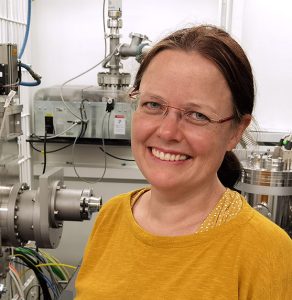
“The ERI project allowed me to step outside my usual science bubble (studying antibodies) and utilise our advanced technology to study the potential threat of nanoplastics. These initial experiments have enabled me to build up a network with various experts, leading to a partnership, for example, with the Technical University of Munich developing new automated methods for analysing nanoplastics.”
— Dr. Melissa Graewert, EMBL Senior Scientist
Fighting pesticide pollution with microbes
Overarching goal: Revolutionising how we manage pesticide pollution
Project purpose: Harnessing microbes to break down pesticides
Achievement: Through the creation of an extensive chemical library of over 1,000 agricultural pesticides, an unprecedented
environmental research tool has been established. This offers us the potential to employ microbial agents as a biologically-driven solution to ease the removal of pesticide contamination, paving the way for more effective monitoring of pesticide pollution and more environmentally-friendly chemical alternatives.
This project was launched in 2021 and supported by donations from the ‘Friends of EMBL‘ and other generous private citizens, enabling the recruitment of a postdoctoral researcher to EMBL, Dr. Richard Jacoby, which also helped him to secure further funding (the EMBL ARISE Fellowship) to continue this project an additional 2 years through 2024. (Funded: €32,000)
Download the pesticide project summary (PDF)
Enhancing artificial hormone detection in wastewater
Overarching goal: Transforming wastewater pollution monitoring
Project purpose: Advancing detection of artificial
hormones through computational models
Achievement: Through this project, a significant step has been taken towards refining the detection and identification
of synthetic hormones within wastewater.
This project was launched in 2021 and supported by donations from the ‘Friends of EMBL‘ and other generous private citizens.
Fellowships
With decades of experience in training pre- and postdoctoral researchers at EMBL, we
are poised to support ambitious scientists to use their curiosity and talents for the benefit of the planet.
Through dedicated ERI fellowships, we would like to support promising researchers from around the world to build ‘‘green’’ careers and refine their research talents for the environment. ERI fellows will work on solution-oriented research projects using EMBL’s world-class molecular biology infrastructure, expertise, and mentorship to address environmental issues.
ERI fellowships are designed to be mid-term projects supporting postdoctoral researchers for 2-4 years. Research areas may focus on any environmental issues like marine and land pollution and conservation, bioremediation, climate change, biodiversity loss, etc.
Gifts in the following amounts support 1 fellowship, including basic laboratory
supplies:
» €160,000/2 years
» €240,000/3 years
» €340,000/4 years
Your donation will:
- provide financial support for postdoctoral researchers to focus on solution-oriented environmental research at EMBL
- support the next generation of environmental scientists through professional training and development in life sciences research
- connect you closely to exciting, meaningful research and the scientists who do it
- pave the way for scientific breakthroughs to tackle global environmental issues
- lead to a deeper fundamental understanding of how molecular biology can improve planetary and human health, catalysing further scientific discoveries
Fellows will be postdoctoral researchers and supported by an EMBL Group Leader.
Fellowships may also include secondments or partnerships with external institutions.
Opportunities to establish the fellowship in your name (or company), in memory of
a loved one, or in honor of someone are also possible.
The research themes and recruitment process will be determined internally by EMBL Group Leaders.
Download the ERI Fellowship summary (PDF)

“Thanks to ERI, I could work on environmental topics while at EMBL. Tackling the problem of nanoplastic pollution meant learning novel practices and considering the needs and limitations to translate our fundamental research to real-world challenges. As a result, this enriched my research at EMBL and encouraged me to advance my career at an institution with a strong focus on environmental research, where I can continue researching both natural substances and pollutants in marine environments.”
— Dr. Stefano Da Vela, Hochschule Bremerhaven and Alfred Wegener Institute
News
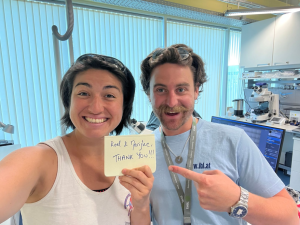
Alumni raise €160,000 to tackle environmental challenges
An EMBL alumni fundraising campaign launched in 2022 to support EMBL’s Environmental Research Initiative (ERI) has surpassed its goal of €18,500 to raise more than €160,000 to support vital environmental research thanks to donations from members of the EMBL community.
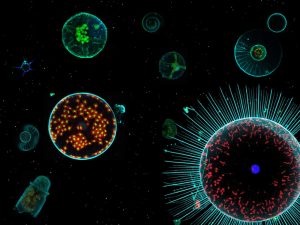
EMBL Alumni Make Possible ERI Grant for Plankton Research (for internal users)
The pilot project will help us to understand how plankton can be used as a biological tool to combat marine pollution and preserve the health of marine ecosystems, using cutting-edge analytical methods to develop plankton-based indicators.
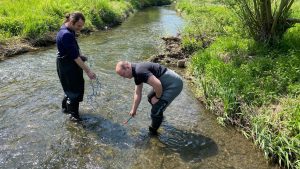
The Power of a Pesticide Library
EMBL research groups apply molecular biology and its research tools to better understand agricultural pesticides, the impacts, degradation, and how to accelerate the degradation. Thanks to ERI support — EMBL now has its own library of more than 1,000 chemicals found in pesticides, which can inform new approaches to pollution clean-up and potentially guide a new generation of agro-chemicals – chemicals potent enough for the intended objective, but that quickly degrade and disappear. This would reduce the environmental impact of pesticides on water, land, and ecosystems.

From Antibodies to Nanoplastics
EMBL researcher applies structural biology (advanced X-ray technology) to better understand the potential threats of nanoplastic pollution on marine ecosystems and humans and offers hope for solutions. But while plastic contamination is pervasive, its impact is not well understood. Researchers lack effective ways to detect and better understand the structure of these degrading plastic particles, which is necessary to evaluate their impact and develop meaningful solutions. To estimate the potential threat, we’re gathering information on nanoplastics’ shape and surface properties. This is important to understand how far they can penetrate into tissues and organs of various organisms, including humans.

The Power of Community
EMBL Director Matthias Hentze describes the Environmental Research Initiative: a community effort to solve global environmental challenges through molecular life sciences research. He has set a challenge for EMBL scientists – to find solutions to society’s most pressing environmental issues through molecular life science research. Supported by philanthropy, this is the aim of the Environmental Research Initiative (ERI), which he launched in 2020.
Supporters
We would like to warmly thank everyone who has supported the Environmental Research Initiative since it was launched in 2020. Those listed below and those who have chosen to remain anonymous.
- Maria Teresa Alonso
- Alexandra Bezler
- Christine Blaumueller
- Christine und Arvid Boecker
- Otto Bräunling
- Maïwen Caudron-Herger
- Andrea Cerase
- Iva Degmecic
- Christian Desaintes
- Bernhard Dobberstein
- EMBL Endowment Foundation
- Matthias Fischer
- Fenia Fotiadou
- Björn Fritz
- Tom Furnival-Adams
- Andres Gaytan de Ayala Alonso
- Fátima Gebauer
- Gregor Gilfillan
- Mark Green
- Gareth Griffiths
- Stephan Heathman
- Matthias Hentze
- Nicola und Thomas Hentze
- Ulrike and Edgar Herrmann
- Christiane and Wolfgang Hiller
- Franziska and Heinrich Hiller
- Georg Friedrich Hoffmann
- Rastislav und Patricia Horos
- Stephanie G Jones
- Norbert Kraut
- Armin Lahm
- Gàbor Lamm
- Maik Lander
- Manfred Lautenschläger
- Tomi Määttä
- Mark Marsh
- Aurora Martinez
- Ailsa and Iain Mattaj
- Anne-Marie Michon
- Tamás Orbán
- Peter Papagiannis
- Nina Papritz
- Lucia Clara and Ulrich Peitz
- Lidia Pérez
- Stephanie Peter
- Savvas Petridis
- Jean Pieters
- Ramesh Pillai
- Laure Plantard
- Vasileios Rantos
- Mehrnoosh Rayner
- Brendan Rouse
- Chris Sander
- Julia and Daniel Schaft
- Bernd Scheifele
- Thomas Schell
- Christian Scherf
- Wibke Schwarzer
- Ira und Thomas Schwarzl
- Barbara Solich
- Roland Specker
- Kerstin and Christian Stippel
- Petra Stockbroekx
- Gemma Texido
- David Tollervey
- Gerrit van Meer
- David Venzke
- Ambra Villani and Kamil Wolanin
- Sonja Welsch
- Roelof and Marijke Wijnaendts-van-Resandt
- Matthias Wilm
- Joana Witkowski
- Janos (Hans) Wittmann
- Samira und Andreas Wördenweber
- EMBL Heidelberg Alumni
- 2020 Friends of EMBL donations that went towards ERI
- Anonymous (several donors wish to remain anonymous)
Join us in celebrating 50 years of world-class science in 2024
As we celebrate 50 years at EMBL in 2024, we are looking towards the future of our planet. With your support, we can launch the first ERI fellowships, providing opportunities for postdoctoral researchers to focus solely on addressing environmental problems through life sciences research, paving the way for innovative solutions and ”green” careers for scientists.
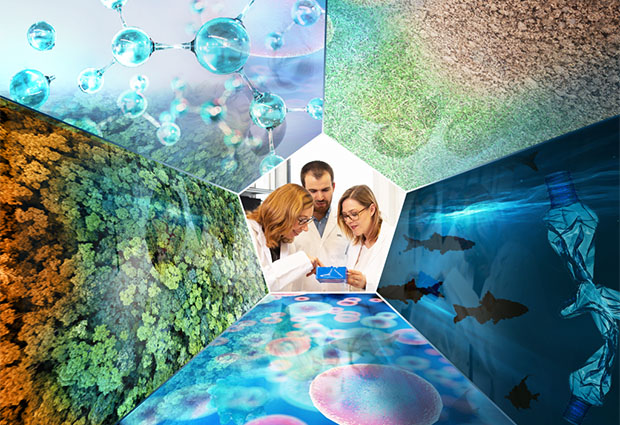
Contact
Have questions about ERI? Contact us at: eri@embl.org